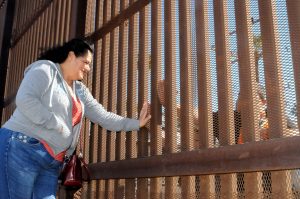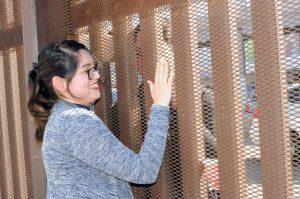
Calexico, California, Feb 14 (EFE).- February 14 will not feel like Valentine’s Day for thousands of immigrants and their families who live apart, but at least Samanta and Marco could visit through a metal fence and he could get to know his US-born son a bit.
The young couple reflects a reality that is made even harsher amid the emotional message of Valentine’s Day.
Thousands of immigrants have to deal with being separated from their families, trying to get by in a hostile environment, navigating the anti-immigrant policy of US President Donald Trump and living with the possibility of being deported to their countries where they have no job opportunities.
“It’s very difficult, it makes me very emotional, but since I can see them from the other side I think they’re better off. Later, I’m hoping to cross (the border) to be able to hug them,” Marco Yanez, 21 – who lives in Mexicali, the Mexican city across the border from Calexico, California – told EFE.
Yanez, who does not have the proper documents to be able to reunite with his family in the US.
Guadalupe Garcia de Rayos, married with two children, was deported to Mexico after living for about 20 years in Arizona for using a false Social Security Number to find work, and her case is just one of many similar stories.

Lydia Guzman, the head of the immigration committee for the League of United Latin American Citizens (LULAC), told EFE that the fear among families of being separated is causing deep psychological damage and, with the recent deportation raids, immigrants have been living with their vulnerability and deep uncertainty.
“Although in Arizona the raids haven’t begun, they’re working on operations, ‘hunting’ people who are reported to Immigration and Customs Enforcement and those who have an (outstanding) deportation order. They’re going to their houses early in the morning,” she said.
Guzman said that the environment for the undocumented community is much more hostile than it was during the Barack Obama administration, given that the rules have been drastically changed by the new president.
“Now, immigrants are the priority. I advise them to talk with attorneys and get prepared for what’s to come,” she said.
Salvador Reza, the representative for day laborers on the Tonatierra Neighborhood Defense Committee, based in Phoenix, said that the situation for immigrants right now is critical.
The activist told EFE that with the massive deportation policies, immigrants are returning to Mexico where they find only rejection, lack of opportunities and corruption.
“The situation is deplorable,” he said, adding that “Trump’s aim is to deport about nine million people.”
Immigrants agree that the threat became a reality when Trump, on his third day as president, signed an executive order to build the border wall with Mexico he had promised during his campaign to construct.
